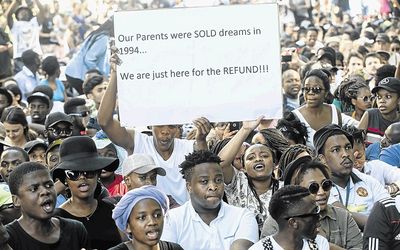Face-to-face outreach can get youngsters to the polls
by Kate Orkin, Daniel De Kadt, Adam Berinsky and Daniel Posner
2016-04-12 06:04:06.0
IN THE last municipal election in 2011, only 28% of young people aged 20-29 voted. Before the first registration weekend for the poll this August, the Electoral Commission of SA (IEC) said more than 80% of the 9.1-million eligible voters who were not registered were under 35 years old.
This is deeply troubling data. Our democracy is at risk if substantial portions of us are disengaged. If young people don’t vote, their concerns will not carry enough weight in the halls of power, and policy will ignore the needs of young people.
It is also deeply puzzling. Young people are far from apathetic. In recent months, thousands of young people have been on the streets, in #FeesMustFall and service delivery protests. Many are engaged as activists in their communities. Why don’t they vote? What can older citizens, civil society and the IEC do to encourage them?
Our research suggests that voter outreach has not been providing what young people are looking for: motivation for why voting is important. Most get-out-the-vote campaigns provide procedural knowledge about when, where and how to vote. But the youth know most of this already: a nationally representative 2012 survey by Ben Roberts and co-authors at the Human Sciences Research Council suggested young South Africans know more than older cohorts about how to register and vote, and trust the electoral process more.
However, young people aren’t motivated to vote. Roberts also found that higher proportions of youth than adults think their vote makes no difference, and lower proportions think it is their civic duty to vote.
Other research finds that our civics curriculum explains how our democracy works, but is not strong in encouraging people to vote.
Most voter outreach is conducted over mass media. However, Don Green at Columbia University and Alan Gerber at Yale University show that having face-to-face, personal conversations with prospective voters about why they should vote is about 10 times more effective than impersonal flyers or text messages (personal phone calls are about four times more effective). In Mozambique and Pakistan, "feet on the street" campaigns by NGOs to reach out personally to voters have improved turnout up to 15 percentage points.
We tested whether face-to-face voter outreach works in SA and found that having a 30 second face-to-face conversation with a young person in Johannesburg makes them significantly more likely to report intending to register and vote. Our research team (based at the Southern Africa Labour and Development Research Unit at the University of Cape Town) surveyed 3,190, mostly black South African citizens aged 18-29 from Gauteng universities and technical colleges, and from multiple sites in Soweto. All participants were eligible but not registered to vote. We then ran a randomised controlled trial, often used in medicine to test if drugs work. Participants were randomly assigned to receive one of seven nonpartisan messages encouraging them to register and vote, or to the control group, which received no message.
Those who received a 30-second message were 6.2 percentage points more likely to report intending to register and 6.3 percentage points more likely to report intending to vote than other young people recruited to the study who did not receive any message. When registration has closed, we will also examine if these messages change whether people actually register and vote.
All messages have some effect. Unsurprisingly, messages that invoke the history of the right to vote in South Africa or tell young people that it is their duty to vote are less effective. Young people are less moved by simple appeals to their sense of duty or history. They want democracy to deliver, today, on substantive issues that affect their lives. Messages that emphasise that every vote counts and can make a difference or that voting can change substantive issues affecting young people, such as unemployment, are most effective.
So, have a personal conversation with every young person you know. Talk about why voting matters. Talk about how registering and voting can achieve change. We have strong evidence that each of us has the power to get more young people to the polls. And in the longer term, civil society, the IEC and the school curriculum need to get better at teaching young people why, not only how, to vote.
• Orkin is a postdoctoral researcher at the Centre for the Study of African Economies at the University of Oxford. De Kadt is a PhD student and Berinsky a professor at the Massachusetts Institute for Technology. Posner is a professor at the University of California in Los Angeles

Last year’s student protests, such as this one at the University of Cape Town, show that SA’s millennials are dissatisfied with the state of education, an improvement of which is crucial for the country to get the economy back on an upward trajectory. Picture: THE TIMES
IN THE last municipal election in 2011, only 28% of young people aged 20-29 voted. Before the first registration weekend for the poll this August, the Electoral Commission of SA (IEC) said more than 80% of the 9.1-million eligible voters who were not registered were under 35 years old.
This is deeply troubling data. Our democracy is at risk if substantial portions of us are disengaged. If young people don’t vote, their concerns will not carry enough weight in the halls of power, and policy will ignore the needs of young people.
It is also deeply puzzling. Young people are far from apathetic. In recent months, thousands of young people have been on the streets, in #FeesMustFall and service delivery protests. Many are engaged as activists in their communities. Why don’t they vote? What can older citizens, civil society and the IEC do to encourage them?
Our research suggests that voter outreach has not been providing what young people are looking for: motivation for why voting is important. Most get-out-the-vote campaigns provide procedural knowledge about when, where and how to vote. But the youth know most of this already: a nationally representative 2012 survey by Ben Roberts and co-authors at the Human Sciences Research Council suggested young South Africans know more than older cohorts about how to register and vote, and trust the electoral process more.
However, young people aren’t motivated to vote. Roberts also found that higher proportions of youth than adults think their vote makes no difference, and lower proportions think it is their civic duty to vote.
Other research finds that our civics curriculum explains how our democracy works, but is not strong in encouraging people to vote.
Most voter outreach is conducted over mass media. However, Don Green at Columbia University and Alan Gerber at Yale University show that having face-to-face, personal conversations with prospective voters about why they should vote is about 10 times more effective than impersonal flyers or text messages (personal phone calls are about four times more effective). In Mozambique and Pakistan, "feet on the street" campaigns by NGOs to reach out personally to voters have improved turnout up to 15 percentage points.
We tested whether face-to-face voter outreach works in SA and found that having a 30 second face-to-face conversation with a young person in Johannesburg makes them significantly more likely to report intending to register and vote. Our research team (based at the Southern Africa Labour and Development Research Unit at the University of Cape Town) surveyed 3,190, mostly black South African citizens aged 18-29 from Gauteng universities and technical colleges, and from multiple sites in Soweto. All participants were eligible but not registered to vote. We then ran a randomised controlled trial, often used in medicine to test if drugs work. Participants were randomly assigned to receive one of seven nonpartisan messages encouraging them to register and vote, or to the control group, which received no message.
Those who received a 30-second message were 6.2 percentage points more likely to report intending to register and 6.3 percentage points more likely to report intending to vote than other young people recruited to the study who did not receive any message. When registration has closed, we will also examine if these messages change whether people actually register and vote.
All messages have some effect. Unsurprisingly, messages that invoke the history of the right to vote in South Africa or tell young people that it is their duty to vote are less effective. Young people are less moved by simple appeals to their sense of duty or history. They want democracy to deliver, today, on substantive issues that affect their lives. Messages that emphasise that every vote counts and can make a difference or that voting can change substantive issues affecting young people, such as unemployment, are most effective.
So, have a personal conversation with every young person you know. Talk about why voting matters. Talk about how registering and voting can achieve change. We have strong evidence that each of us has the power to get more young people to the polls. And in the longer term, civil society, the IEC and the school curriculum need to get better at teaching young people why, not only how, to vote.
• Orkin is a postdoctoral researcher at the Centre for the Study of African Economies at the University of Oxford. De Kadt is a PhD student and Berinsky a professor at the Massachusetts Institute for Technology. Posner is a professor at the University of California in Los Angeles
























